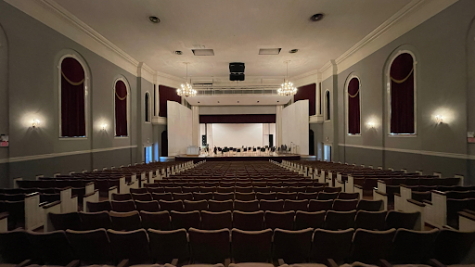Is the Guilford Edge edging out non-traditional and CCE students?
My heart is racing like a Neil Peart drum solo for two reasons. First, I just stepped foot on Guilford College campus for the first time since March 2020. This is the case for many, many fellow students and the energy is palpable. Second, I’m afraid that I might have completely forgotten how to be human. From the before-times to today, our Guilford College community, our country and indeed, the entire world has suffered a great deal. We are, justifiably, cautious to throw the red flags of victory over an invisible virus. Bonus third reason for my beady forehead: I’m cutting it close to being late on the first day of class.
Donning my mask, I take a deep breath and reach for the doorknob and turn. It’s locked. Luckily, a faculty member scanned her badge and graciously allowed me to enter behind her. I find a seat in the back of the room and plop and gasp. I had a rough time getting out of work in time to drive the hour to school. My boss doesn’t quite understand the reasons behind the new Guilford Edge curriculum, and she’s far from alone. If I’m being honest, I am not only a bit confused about the complete switch, but slightly frustrated.
As a 30-something, non-traditional student returning to college, finding an appropriate work/life/school balance is crucial in my decision to enroll at Guilford College. I met with an advisor at the Center for Continuing Education who gave me the rundown. I can’t specifically recall the word-for-word conversation, but a short blurb on the College’s website for the program explains why Guilford feels that it’s the right choice for adult students: “We understand the challenges you face juggling responsibilities and finances. For that reason, we’ve created a price structure that makes it easier to invest in your future — one that’s sensitive to the specific needs of our Continuing Education students.”
The webpage also boasts, “Guilford offers 40-plus majors, and as a Continuing Education student, you can be a full-time student by attending classes as few as two days a week.” Between the promise of a flexible schedule and a discounted tuition, I was happy to call myself a Guilford Quaker. However, around the end of my sophomore year, the school transitioned to what it’s calling The Guilford Edge.
The curriculum is based on block scheduling that has proved efficient over the last several years in high schools around the country. For three weeks of the 15-week semester, students are required to take a single course that meets five days a week for three hours a day. The recent shift has placed pressure on faculty and students alike to cram as much learning into these three weeks as possible. This new schedule makes the challenges for CCE students even more of a struggle.
The assigned classroom for my three-week course comprised the instructor, Tracie Fellers (visiting assistant professor of English and Creative Writing), four traditional students (one of which was the TA), a little over a dozen Early College students, and a single CCE student. It absolutely makes sense for a schedule like this to work for high school students. Without the pressures and responsibilities of adult life, commuting to school five days a week isn’t a problem. Most of my classmates are brought to and picked up from campus by their parents.
I, however, have more hurdles on my path to school. I crunched some numbers and concluded that this type of schedule cannot at all benefit an adult-aged, non-traditional student. Here is what my math told me:
At the end of the three-week semester, I will have driven 1,800 miles, sat for nearly 34 hours in my car, and will have spent nearly $200 on gas; a far cry from the two days a week the CCE homepage promises. Of course, these conditions do not affect traditional students as much, but add a burden to what is already busy life for an adult student. According to a 2014 article on collegefactual.com, non-traditional students’ graduation rate is 33.7% compared with 54.1% of traditional students.
Though I can make this schedule work, which may or may not be an arguable statement, I know that myriad other students attempting to finish a degree as an adult cannot. My wife is the primary source of income while I’m in school. I also have a boss that allows for a flexible schedule, and more importantly, I do not have children. How can a school claim to make it easy for older students to finish their schooling while expecting them to take part in such a schedule?
For me to receive student loans, I must be a full-time student and cannot skip the three-week portion of the semester. I could make an argument that someone could take four classes in the 12-week, but that only creates a more stressful semester and risks being overworked, which most likely will negatively affect my grades. Does Guilford College’s decision to pursue a block schedule show bias and/or prioritize traditional as well as Early College students over non-traditional students? I think it does.







